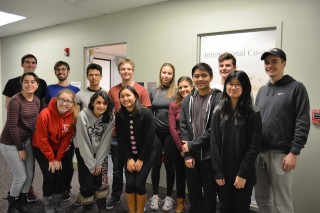News & Events
Event
ALERT and Gordon-CenSSIS Scholars Participate in Presentation Skills Seminar February 10, 2017
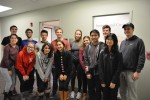
On February 1st 2017, the ALERT and Gordon-CenSSIS Scholars participated in a Presentation Skills Seminar. The ALERT and Gordon-CenSSIS Scholars Program is designed to provide freshman engineering students with opportunities to participate in research projects, STEM outreach, and professional development training. At the seminar, the Scholars discussed introductory presentation skills, with a particular focus on PowerPoint. This seminar is one of many regular meetings the Scholars will attend to improve upon their general leadership and research skills.
Spring 2017 ASPIRE Announced January 27, 2017

Every year ALERT and Gordon-CenSSIS host the Annual Student Pipeline Industry Roundtable Event (ASPIRE) aimed at building connections between students and ALERT industrial collaborators. The upcoming ASPIRE will be held on Thursday, March 16, 2017 at Northeastern University and will feature presentations by industry members, a poster session by students, and a “speed-dating” session for students and industry members to have one-on-one time to discuss their common goals.
The previous ASPIRE (held in Spring 2016) was attended by students from ALERT’s academic partner institutions, as well as representatives from the following ALERT industrial collaborators: American Science & Engineering, Analog Devices Inc., HXI LLC, Morpho Detection, Passport Systems Inc., Rapiscan Systems, and Raytheon Company; as well as representatives from two government agencies, the Transportation Security Laboratory (TSL) and the Department of Homeland Security (DHS).
ASPIRE continues to give students the opportunity to present their research and career aspirations to industry members looking to recruit for internships and full-time positions. ASPIRE also offers participants a unique format in which to cover a broad range of topics significant to the Homeland Security Enterprise, and provides students and industry members with meaningful and effective networking opportunities.
This event is by invitation only for our ALERT and Gordon-CenSSIS industry members and students. More details and an agenda are forthcoming.
Photo caption: Yongfang Cheng, Northeastern University PhD candidate meeting with Piero Landolfi and Kurt Bistany of Morpho Detection at the 2016 ASPIRE.
Fundamentals of Explosives Course January 27, 2017
A Fundamentals of Explosives Course is being offered at the University of Rhode Island from May 2-4, 2017. This course examines the chemistry of explosives, the physics of detonation waves and their initiation, and the issues involved in safe handling and characterizing these materials. Explosive output and coupling to surroundings, with specific application to structural response, will be discussed. The course will address terrorist bombings, the gathering, analysis and interpretation of evidence, improvised explosives, and explosive detection. Lecturers are internationally known experts.
There will also be an optional Explosive Analysis & Safety session on Friday May 5, 2017 with an emphasis on techniques in mass spectrometry and thermal analysis as well as best practices in laboratory work with explosives.
Space is limited and early registration is encouraged. For more information about this course, please reach out directly to ALERT researcher, Dr. Jimmie Oxley at [email protected].
Year 4 Program Review Highlights ALERT Student Involvement January 27, 2017
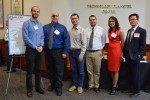
The ALERT Year 4 Program Review was held on January 11th & 12th at Northeastern University in Boston, Massachusetts. The purpose of this review was to evaluate the ALERT research portfolio at both the theme and project levels, as well as the Center’s education program, transition efforts, and industrial partnerships. Several graduate students from ALERT’s academic partner institutions presented at this year’s review on behalf of the research projects in which they are currently involved.
University of Rhode Island PhD candidates, Austin Brown and Kevin Colizza presented on ALERT research related to the characterization and safe elimination of explosives materials, which they conducted under the guidance of Dr. Jimmie Oxley. Research in explosives characterization and elimination is especially important to those in the Homeland Security Enterprise tasked with the detection, identification, and destruction of homemade explosives (HMEs), such as bomb squads, and other first-responders.
Purdue University M.S. candidate, Nick Cummock presented on ALERT research led by Dr. Steven Son and related to small-scale characterization of homemade explosives (HMEs). The specific compositions of HMEs are nearly limitless, so making accurate assessments of threats from these materials is challenging. This research project seeks to develop a small-scale experimental approach that will result in quicker and more cost-effective characterization of HMEs, leading to greater accuracy in modeling and prediction of explosives related threats.
University of Puerto Rico Mayagüez M.S. candidate, Amanda Figueroa presented on her research project led by Dr. Samuel Hernandez. This research project deals with the use of infrared spectroscopy (IR) in standoff mode and coupled to laser sources operating in the mid-infrared (MIR) to develop confirming orthogonal chemical sensors for detecting explosives residues on clothing, travel bags, personal bags, laptop bags/cases, skin, and other substrates.
Xiao Wang, another Purdue University student and PhD candidate, presented on ALERT research conducted under the guidance of Dr. Charles Bouman and Dr. Ken Sauer related to advanced baggage screening and automatic target recognition (ATR), which is achieved via algorithms and devices primed to recognize objects based on data obtained from sensors. This research project seeks to improve the detection of potential threats in scanned baggage and reduce the false alarm rate without compromising safety at airport security checkpoints, resulting in a reduction of security costs and an overall safer and smoother experience for passengers.
Northeastern University PhD candidate, Mengran Gou presented on ALERT research led by Dr. Octavia Camps and Dr. Mario Sznaier and related to video-based methods to identify and track potential threats in heavily crowded public spaces. Video-based methods have an enormous potential for providing advance warning of terrorist activities and threats. In addition, they can assist and substantially enhance localized, complementary sensors that are more restricted in range, such as radar, infrared, and chemical detectors.
In addition to the outstanding ALERT student presentations that took place at the Year 4 Program Review, the Center introduced four new research projects taking place at Boston University, Duke University, Purdue University, and the University of Notre Dame.
Photo caption: ALERT Students (from left to right): Nicholas Cummock (Purdue University), Kevin Colizza (University of Rhode Island), Xiao Wang (Purdue University), Austin Brown (University of Rhode Island), Amanda Figueroa (University of Puerto Rico Mayagüez), and Mengran Gou (Northeastern University).
ALERT Student-Led Webinar on Thursday, December 1st November 30, 2016
We will be holding our first ALERT Student-Led Webinar on Thursday, December 1st from 11:00 – 12:00pm EST. This webinar is part of the ALERT Skill-Builder Webinar Series, and will be led by two of our ALERT students, Amanda Figueroa and Matthew Tivnan, who will present on state-of-the-art tools and techniques that have influenced their research processes.
Please find more information about the speakers and presentation topics below:
“Cleaning Validation with Quantum Cascade Laser Spectroscopy”
Amanda Figueroa, M.S., Physical Chemistry, University of Puerto Rico Mayagüez
Abstract: How to use and apply chemometrics by PLS Toolbox (Matlab based platform) to extract infrared signals from microorganisms and pharmaceutical traces of compounds. This is highly applicable to bioterrorism, biomedical and manufacturing scenarios since bacterial contamination is an urgent public health issue that needs to be monitored. I will discuss simple examples of how we are able to quantify and distinguish microorganisms in a way that is user-friendly to untrained personnel.
“Microwave Imaging in Biological Tissue”
Matthew Tivnan, BS, Electrical Engineering and Physics, Northeastern University
Abstract: Numerical optimization techniques with a focus on Engineering research applications. Specific topics covered include cost functions, gradient descent, newton’s method, and stochastic techniques.
This is a closed event for the ALERT Community. If you are an ALERT Community member and would like to attend, please contact Melanie Smith at [email protected] for information on how to connect.
RAND 2017 Graduate Student Summer Associate Program November 30, 2016
DHS’s new Federally Funded Research and Development Center (FFRDC), the Homeland Security Operations Analysis Center (operated by Rand) sponsors a Graduate Student Summer Associate Program at RAND. All applications are due January 5, 2016.
This program provides a great opportunity for graduate students across the Centers of Excellence to explore a career serving the Homeland Security Enterprise through FFRDC research and analysis. The program is designed for full-time students who have completed at least two years of graduate work leading to a doctorate or professional degree. Further details about the program and eligibility criteria are described on our Graduate Student Summer Associate Program website.
This year’s application instructions are listed on the program website.
ADSA14 Presentations Now Available October 31, 2016
We are pleased to announce that the ADSA14 Workshop presentations are now available for download. View all slides, as well as the reports from past ADSA workshops here.
If you have any questions regarding the topics and technologies discussed at the workshop, please contact Carl Crawford at [email protected].
DHS S&T to Conduct Virtual Facebook Town Hall to Improve Industry Partnerships September 23, 2016
On September 27, from 1-2 p.m. ET, DHS S&T Office of Public-Private Partnerships invites you to join in a Facebook virtual town hall. The purpose of the meeting is to discuss how S&T collaborates with industry, and is an opportunity to provide S&T with feedback on how to improve partnerships and engagement efforts to make it easier and more efficient to work with DHS:
“The S&T Office of Public-Private Partnerships is dedicated to redefining the way S&T does business with industry innovators to find more effective and novel ways to research, develop, and transition new technologies for our customers within the HSE. We know we cannot do this alone, so we’re looking for input on ways we can improve our outreach to ensure that we clearly communicate high-priority needs and requirements. We also welcome feedback on our existing opportunities and tools for traditional and non-traditional partners as we engage with them to discover, connect, develop, and transition technologies”
For more information on the event, visit the official event page.
ALERT REUs Present Summer Research August 29, 2016
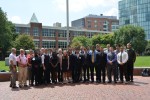
This summer, ALERT hosted three undergraduate students at Northeastern University to participate in a 10-week Research Experience for Undergraduates program. The ALERT REU program at NEU is partnered with other REU programs in the university’s College of Engineering, and builds a cohort of motivated students who attend professional development meetings and program activities, including presentations on Research Ethics, Lab Safety, PowerPoint Presentation Skills and Scientific Storytelling. At the end of the summer, each REU gives a final presentation of their research project. The presentation addresses the project’s overall mission and endeavors, the REU’s specific contributions to the project, as well as what knowledge and skills they gained through the process. This year’s students worked on projects related to ALERT’s Bulk Sensors & Sensor Systems research.
REU Anthony Bisulco (’18) is a third year NU student who worked with Professor Jose Martinez-Lorenzo on ALERT’s Rapid Security Threat Detection via MIMO (Multiple Input, Multiple Output) Millimeter Wave Imaging project.
In his words, “The main purpose of my REU project is to improve the overall passenger experience during the airport security screening process. Currently, this process is plaqued with many downfalls such as slow throughput, frequent false alarms and significant passenger divestment and recollection. The working goal of the project I am working on is to improve this process by creating ‘On the Move Screening’ where passengers walk at a normal pace through what appears to be a tunnel without the need to divest any clothing or personal items.”
Anthony’s project worked to increase the image quality of a 3D imaging millimeter wave radar (“Tunnel System”) with the goal of improving the system’s threat detection capability. “One part of this radar is various transmitters/receivers which illuminate/receiver the target (Human Torso) at various angles. As a result of adding transmitters/receivers the image quality is increased. Rather than adding multiple transmitters or receivers, my project added microwave switches to the system, which is the equivalent of adding more transmitters and receivers for imaging. Overall, I mainly designed the system for controlling these switches and developed some algorithms for optimizing the best imaging positions.”
Spencer Pozder (‘19) and Justin Xia (‘19) worked with Professor Carey Rappaport on Feasibility Investigations in Multistatic Imaging Techniques for their Research Experience. Currently, active millimeter wave radar is used for imaging objects concealed on the human body at airport security checkpoints. The current monostatic configurations are unable to accurately image objects at certain angles, give lower resolution, cost more, trigger more false alarms and have longer execution times. ALERT is interested in a multistatic configuration in an “On the Move” scanning system, capable of receiving image information from multiple angles in parallel, possibly increasing resolution and accuracy of the images produced.
The team developed a product using hardware from ALERT Industrial Partners, Rapiscan and Analog Devices, creating a functional system and imaging algorithm capable of reconstructing images. They also redesigned and relocated transmitter and receiver boards to accommodate the optimized system configuration and designed mechanical structure for holding transmitters and receivers. The “On the Move” system is currently being prototyped and patented.
In addition to this program, ALERT partner universities, including the University of Puerto Rico at Mayagüez and Notre Dame, also hosted summer REU participants in their labs.
The REU program is hosted and sponsored by the Awareness and Localization of Explosives-Related Threats (ALERT) Department of Homeland Security Center of Excellence, and the Bernard M. Gordon Center for Subsurface Sensing and Imaging Systems (Gordon-CenSSIS), a Graduated National Science Foundation Engineering Research Center.
ADSA15: Save the Date! August 19, 2016
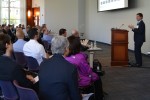
The Fifteenth Advanced Development for Security Applications Workshop (ADSA15) will be held on November 15th and 16th at Northeastern University in Boston, Massachusetts. The title of the workshop will be “Next Generation Screening Technologies and Processes for the Checkpoint.” This workshop is a continuation of ADSA12, ADSA13, and ADSA14. The workshop is being convened by the DHS Center of Excellence (COE) for Awareness and Localization of Explosives-Related Threats (ALERT).
Presentation and panel discussions will address the following topics:
- Emerging hardware and algorithms
- Concepts of operations
- Protecting soft targets
- Data analytics – application to aviation security
- System architectures
- Business aspects of fusion
- Funding, innovation and deployment models
For more information on the ADSA workshops, visit our ADSA Workshop Page
This workshop is by invitation only.
If you are interested in learning more, or receiving an invitation, please contact Melanie Smith at [email protected].

